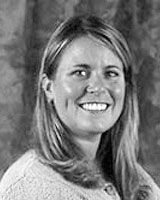非常抱歉,
你要访问的页面不存在,
非常抱歉,
你要访问的页面不存在,
非常抱歉,
你要访问的页面不存在,
验证码:

职称:MA, OTR/L, ATP Lecturer
所属学校:Tufts University
所属院系:Department of Occupational Therapy
所属专业:Occupational Therapy/Therapist
联系方式:617.627.5720
In 1984 my aunt Kathy suffered a spinal cord injury as a result of a diving accident. I was 11 years old at the time and would accompany my mom on monthly trips to New York to go visit Kathy in the rehabilitation hospital. It was at that time that I became interested in working in the field of rehabilitation. I asked my aunt which of her therapists helped her most and she replied, "My OT has helped me do the most."
I have watched my aunt achieve many milestones of independence over the years--driving her own van, using a computer, using a telephone, controlling electrical items in her environment such as her TV, lights, and radio, feeding herself, signing her own thank you cards and checks, returning to school to obtain her law degree, and starting a career. All of these things were made possible by her willingness to adapt her way of doing things and by using adaptive devices and assistive technologies. So when I became an occupational therapist I had a special sense of the use of compensatory techniques and adaptive devices. I started my work as an occupational therapist in 1996 at Spaulding Rehabilitation Hospital in Boston, Massachusetts. I have worked with the spinal cord injury, brain injury, and amputee populations. I continued to stay interested in the role assistive technology (AT) plays in improving my patient's independence so in 2001, I began working in Spaulding's Assistive Technology Center. Then in 2003, I began teaching the Assistive Technology (AT) course at Tufts, with another occupational therapist, Molly Campbell, who works at the Adaptive Design Center at Perkins School for the Blind. The course is geared towards occupational therapy and engineering students who are interested in being creative in their approach to using AT to help people with disabilities.